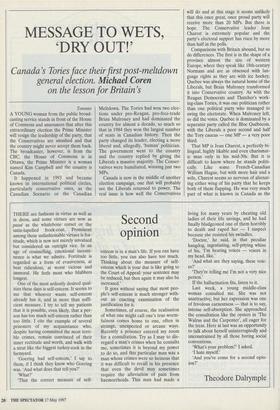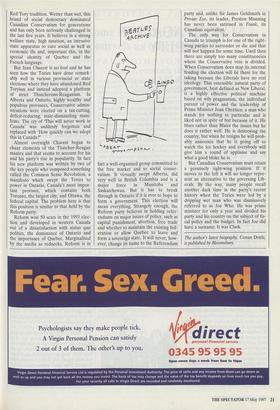MESSAGE TO WETS, `DRY OUT!'
Canada's Tories face their first post-meltdown
general election. Michael Coren
on the lesson for Britain's
Toronto A YOUNG woman from the public broad- casting service stands in front of the House of Commons and announces that after this extraordinary election the Prime Minister will resign the leadership of the party, that the Conservatives are smashed and that the country might never accept them back. The broadcaster, however, is from the CBC, the House of Commons is in Ottawa, the Prime Minister is a woman named Kim Campbell and the country is Canada.
It happened in 1993 and became known in international political circles, particularly conservative ones, as the Canadian Scenario or the Canadian Meltdown. The Tories had won two elec- tions under pro-Reagan, pro-free-trade Brian Mulroney and had dominated the country for almost a decade, so much so that in 1984 they won the largest number of seats in Canadian history. Then the party changed its leader, electing a more liberal and, allegedly, 'human' politician. The government went to the country and the country replied by giving the Liberals a massive majority. The Conser- vatives were humiliated, winning just two MPs.
Canada is now in the middle of another election campaign, one that will probably see the Liberals returned to power. The real issue is how well the Conservatives will do and at this stage it seems unlikely that this once great, once proud party will receive more than 20 MPs. But there is hope. The Conservative leader Jean Charest is extremely popular and the party's electoral support has risen by more than half in the polls.
Comparisons with Britain abound, but so do differences. The first is in the shape of a province almost the size of western Europe, where they speak like 18th-century Normans and are as obsessed with lan- guage rights as they are with ice hockey. Quebec was always the natural home of the Liberals, but Brain Mulroney transformed it into Conservative country. As with the Reagan Democrats and Thatcher's work- ing-class Tories, it was one politician rather than one political party who managed to swing the electorate. When Mulroney left, so did the votes. Quebec is dominated by a separatist party called the Bloc Quebecois, with the Liberals a poor second and half the Tory caucus — one MP — a very poor third.
That MP is Jean Charest, a perfectly bi- lingual, highly likable and even charismat- ic man only in his mid-30s. But it is difficult to know where he stands politi- cally. Like some French-Canadian William Hague, but with more hair and a wife, Charest seems so nervous of alienat- ing either wing of his party that he keeps both of them flapping. He was very much part of what is known in Canada as the Red Tory tradition. Wetter than wet, this brand of social democracy dominated Canadian Conservatism for generations and has only been seriously challenged in the last five years. It believes in a strong welfare state, high taxation, an intrusive state apparatus to cure social as well as economic ills and, important this, in the special identity of Quebec and the French language.
But Jean Charest is no fool and he has seen how the Tories have done remark- ably well in various provincial or state elections where they have abandoned Red Toryism and instead adopted a platform of strict Thatcherism-Reaganism. In Alberta and Ontario, highly wealthy and populous provinces, Conservative admin- istrations were elected on a tax-cutting, deficit-reducing, state-dismantling mani- festo. The cry of 'This will never work in Canada' was suddenly forgotten and replaced with 'How quickly can we adopt this in Canada?'
Almost overnight Charest began to chant elements of the Thatcher-Reagan mantra and that seems to account for his and his party's rise in popularity. In fact his new platform was written by two of the key people who composed something called the Common Sense Revolution, a manifesto which swept the Tories to power in Ontario, Canada's most impor- tant province, which contains both Toronto, the largest city, and Ottawa, the federal capital. The problem here is that this position is similar to that held by the Reform party.
Reform won 50 seats in the 1993 elec- tion and developed in western Canada out of a dissatisfaction with status quo politics, the dominance of Ontario and the importance of Quebec. Marginalised by the media as rednecks, Reform is in fact a well-organised group committed to the free market and to social conser- vatism. It virtually swept Alberta, did very well in British Columbia and is a major force in Manitoba and Saskatchewan. But it has to break through in Ontario if it is ever to hope to form a government. This election will mean everything. Strangely enough, the Reform party believes in holding refer- endums on major issues of policy, such as capital punishment, abortion, free trade and whether to maintain the existing fed- eration or allow Quebec to leave and form a sovereign state. It will never, how- ever, change its name to the Referendum party and, unlike Sir James Goldsmith in Private Eye, its leader, Preston Manning has never been satirised in Frank, its Canadian equivalent.
The only way for Conservatism in Canada to triumph is for one of the right- wing parties to surrender or die and that will not happen for some time. Until then there are simply too many constituencies where the Conservative vote is divided. When Conservatism does stop its internal feuding the election will be there for the taking because the Liberals have no real ideology. This ostensible natural party of government, best defined as New Liberal, is a highly effective political machine based on wily pragmatism, the individual pursuit of power and the leadership of Prime Minister Jean Chretien, a man who stands for nothing in particular and is liked not in spite of but because of it. He blurs rather than Blairs the issues but he does it rather well. He is destroying the country, but when he resigns he will prob- ably announce that he is going off to watch the ice hockey and everybody will give him a round of applause and say what a good bloke he is.
But Canadian Conservatism must retain a genuinely right-wing position. If it moves to the left it will no longer repre- sent an alternative to the governing Lib- erals. By the way, many people recall another dark time in the party's recent history when the Tories were led by a dripping wet man who was dismissively referred to as Joe Who. He was prime minister for only a year and divided his party and his country on the subject of fis- cal policy and the budget. In fact Joe did have a surname. It was Clark.
The author's latest biography, Conan Doyle, is published by Bloomsbury.



































































 Previous page
Previous page